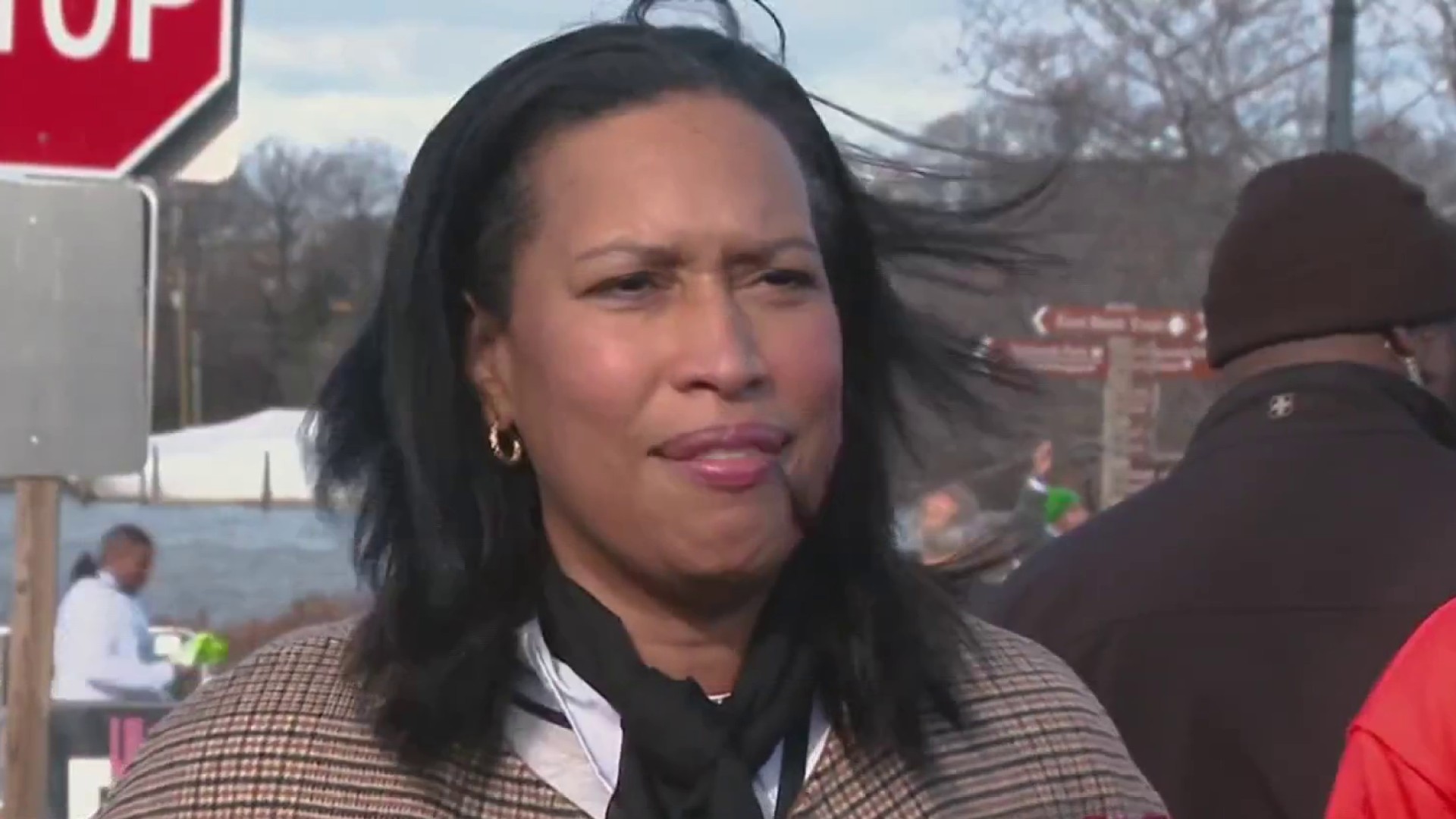
Before late April, Virginia Beach resident Shameika Stepney’s year was about as “normal” as anyone else’s. COVID-19 quarantines had been in effect for just over a month, forcing people to spend their days and nights indoors and looking for every safe opportunity to get a little fresh air.
For Stepney, those fleeting moments of relief came in the mundane tasks we might’ve loathed in the Before Times, like walking to the mailbox to fetch whatever bills and junk mail lurked inside. The short walk became part of her lockdown routine to break up the monotony of the new normal.
Little did she know one April curbside trek would flip her already abnormal world on its head when a card arrived from her third-grade teacher, Linda Kunhardt from the private Episcopal school St. Hilda’s & St. Hugh’s in Stepney’s hometown of Harlem, New York.
That card would set in motion a chain of events that led Stepney — a lifelong musician who released music under the monikers Dollface and Chyna Doll for decades — to pen and record a new track by summer’s end called “Shameika Said,” featuring former schoolmate and art-pop legend, Fiona Apple, all because of words she’d shared when they were kids.
We've got the news you need to know to start your day. Sign up for the First & 4Most morning newsletter — delivered to your inbox daily. Sign up here.
Coincidentally, Stepney said she’d been dreaming about her old school, but not because of what caused Kunhardt to reach out.
Instead, what would transpire over the summer, Stepney ultimately saw as the coming-full-circle moment of a chapter 30 years in the making. It made an unusual amount of sense in an otherwise nonsense year.
Local
Washington, D.C., Maryland and Virginia local news, events and information
Stepney hadn’t spoken to her teacher since she was in the fourth grade. Why was Kunhardt reaching out for now, after all this time?
“I’m looking at the postage and I’m like, Miss Koony? I opened it at the mailbox and I started reading it because I knew it was one of those types of things,” Stepney tells me, eyes beaming and smiling wide, over Zoom on a recent warm December afternoon.
As she walked back inside, Stepney furiously read her long-ago teacher’s words, a thankful message commending her former student for being another’s advocate when it mattered most.
Kunhardt explained: Some three decades ago, a student by the name of Fiona McAfee was bullied in the school’s cafeteria. The then-third grader was trying to sit with some of the popular girls at lunch when they laughed at her. That’s when Stepney stepped in.
“You told Fiona not to worry about bullies and that she had potential,” Kunhardt wrote.
Alright, Stepney thought, but why did this moment matter now?
Because that little girl would grow up to become the pop star and singer-songwriter Fiona Apple, and on her highly anticipated 2020 album, “Fetch the Bolt Cutters,” she’d written a song preserving Stepney’s actions for the rest of time.
“I was like, jaw unhinged,” Stepney admitted, a trace of disbelief still shrouding her words despite the months she’d had to come to terms with the acknowledgment.
Immediately, Stepney typed her own name into the Apple Music app on her phone, and sure enough, the search results returned the exact song her teacher reached out about.
Without further delay, Stepney pressed play. As the song streamed on and Apple sang “Shameika said I had potential” over and over again, Stepney still couldn’t quite grasp the unraveling situation.
“I was like, oh, my God, wait a minute — because part of you is not believing this and then, it’s obviously real because it’s right in front of you. Because I’m listening on Apple Music, and I’m reading the words and everything,” she said.
Even as bizarre as that spring day was, it was only the beginning of an unexpected ride for Stepney that began days earlier when her elementary school teacher read a March story in The New Yorker in which Apple admitted she wasn’t sure if Shameika, the subject of arguably the most well-received track on her now critically acclaimed album, was a real person.
A month later, Vulture Magazine published a story where Apple breaks down the meaning between each song on the album.
Of “Shameika,” Apple told Vulture:
“Shameika is real. When I first wrote the song, I was not entirely convinced she existed. Because I have this one memory and it’s a very big memory for me. But maybe I created this person. My third-grade teacher, Linda Kunhardt, was my favorite teacher. I’ve kept in touch with her over the years. She read the New Yorker article, and the next day, she sent me an email saying, “I heard you wrote about Shameika. I can see her …” She sent me a picture of her.”
Apple’s song is quintessential Fiona — a dizzying and punchy piano melody that makes the uneasiness of dodging bullies palpable. Raucous and racing like the heartbeat of a bullied child.
Soon after its release, fans wondered who Shameika was, calling on the power of the internet to find the mysterious character. Stepney sat back and watched as she became a hashtag and trending topic on Twitter. Covers of the song popped up on streaming platforms, each taking their own twist on the summer’s unexpected anthem for courage and cementing Stepney’s place in history.
Tributes poured in on Twitter to the then-unknown Shameika by way of video, meme, and even a cookie cake.
The song would go on to receive two Grammy nominations, one for best rock song and another for best rock performance.
Shaken to her core, Stepney hit the pause button before reconnecting with Apple. While the entire experience caught her off guard, Stepney wasn’t surprised that her youthful words stuck with Apple.
“This is the thing, that’s who I am... I speak life on people. I do it now,” she said. “It didn’t stand out to me. But, oh my god, to her — and that’s what we gotta realize as humans. Sometimes, we don’t realize that something so small that you may not even, you might overlook it, it might be something major in someone else’s life because of how it makes them feel. At that time, she was like, ‘Shameika, you know, no one ever stuck up for me,’” she said.
The former classmates finally reconnected in July over FaceTime, taking turns recollecting their memories.
It wasn’t until then that Fiona, who sang in her song that Shameika “got through to me and I’ll never see her again,” learned why Stepney disappeared from school after standing up for her: Stepney was expelled from the private school.
On paper, the reason for her expulsion was fighting. Stepney sees it differently.
“I went through a lot of racial stuff in the school,” she said. “My first experience with dealing with racism was in St. Helens when I was in the first grade. I remember the teacher’s name and what she did.”
Stepney explained she wasn’t just some deus ex machina to young Apple, but was forced out of the school for defending herself from hate.
“That’s why you don’t ever remember seeing me again,” Stepney told her.
Their reunion was perfectly timed if you ask Stepney, who had recently begun having nightmares of the racism she experienced in grade school.
“That whole scenario, it seemed like the creator of the universe set that up for what’s happening right now, you understand? Because light is being shined on all of these things right now, more than any other time in all of our lives, you understand? The Black Lives Matter movement, things of that nature,” she said.
Turns out, a year after Stepney shepherded a young Apple, she’d needed someone to stand up for her. But here Apple was, returning the favor decades later.
Once she’d had time to process the unexpected, Stepney set her eyes back on the studio to craft a response as an artist should — through song. She reached out to longtime friend Ken Brockington, who she’d met back when she auditioned in Teddy Riley’s Virginia Beach recording studio to rap on a Blackstreet album, to see who he thought could help produce her record.
Brockington linked her up with Virginia Beach producer Shomarr Map, a.k.a. Rhyte-Jus. After a quick conversation in early August, Rhyte-Jus and Stepney got to work.
“They told me the story and I was like, OK, yeah, I would like to meet Shameika. So, Kenny hooked it up and we talked the next day,” he said.
“The next day, I was in the studio laying the track down,” Stepney added.
Apple signed on to the project and the trio worked across the country to create “Shameika Said,” a record that, sonically, is the flip side of Apple’s audible anxieties – a warm, lulling groove into self-assuredness, love and lyrically, a touch of “told ya so.”
“The little mean girls, what they got to say now?” Stepney asks, laughing. “You better be careful, better watch out who you’re mean to because you never know who they are gonna grow up to be? The world is round and there’s no window. You can’t escape. You better be nice to people.”
For Apple’s part, she rerecorded the beloved hooks to contribute to Stepney’s track, the result of which presents a vocal side of Apple the world hadn’t heard previously.
"She stood up for me / I wish I could have done the same for her," Apple sings on the record.
Her team made every effort to make the cross-country collaboration successful, Stepney added, noting they eagerly sent whatever audio files were needed in the Beach studio she worked from.
The song, now streaming on all major platforms, tied up the loose ends of shared childhood trauma. Stepney and Rhyte-Jus knew they’d done right by themselves. Apple’s approval only confirmed it.
“When Fiona heard it, she said our voices love each other, and they do. They sound so good. Like, girl, when I heard that [expletive] like all together? It literally gave me chills. I was shaking. I felt it in my bones. Puff Daddy talked about that. When you get the goosebumps, you know you got a hit. It needs to come out, other people need to hear the song,” Stepney said.
For the most part, Stepney has been featured on projects here and there since she moved south. Because of the song, she’s considering dipping her toe back into the music industry waters.
She and Rhyte-Jus are bringing the lessons they learned from “Shameika” with them.
Rhyming used to be a game for older heads, but has since come under the siege of young kids, she said. With that, she said so much of hip-hop’s hits champion the negative. She’s tired of watching young rappers speak on taking pills, brag about guns, and in the most unfortunate situations, speak their deaths into existence.
Like Stepney said when she was just a kid, you have to focus on the potential.
“Maybe we need to start doing more music like this,” she said, referring to the two songs that bear her own name, illustrating the character she exhibited long ago. “I’ve noticed a lot of the rappers and people in music speaking their own death. If we can do it in that way, then we can reverse it and speak positivity and about abundance and prosperity. We can do the same thing, you know what I mean? I’m not trying to preach to everybody and every single song is not going to be about roses and rose petals or whatever. We need balance.”



